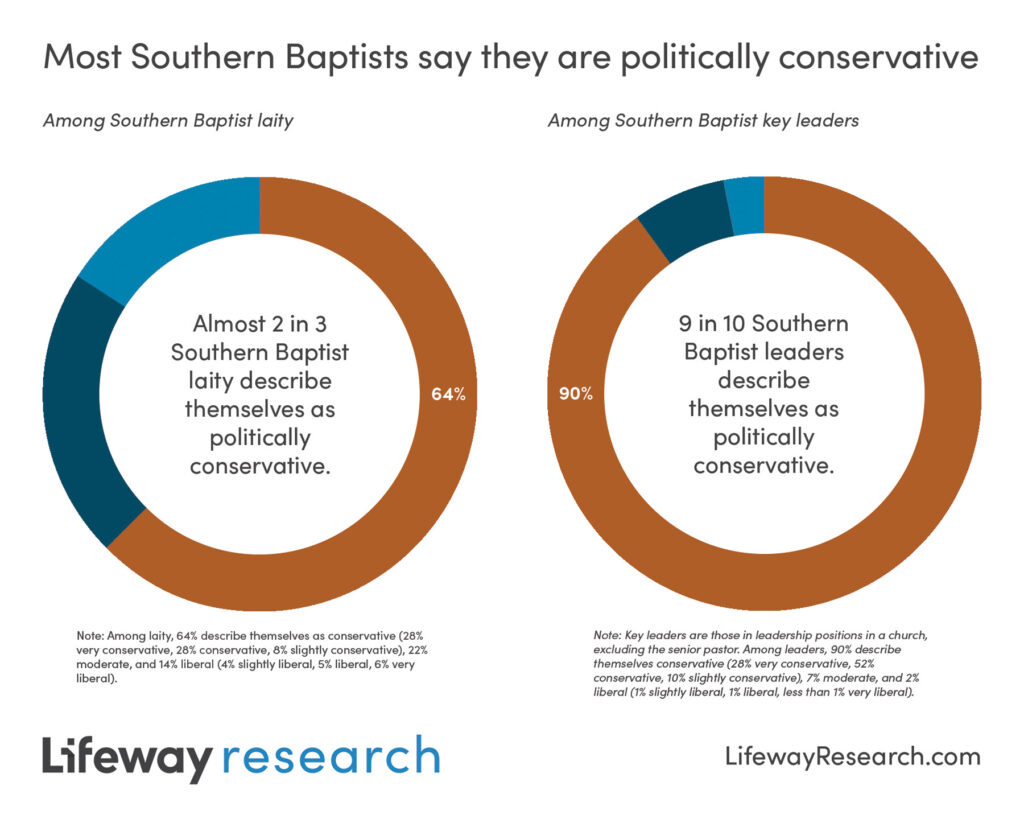So you thought all Southern Baptists were conservative Republicans? Think again.
14% of Southern Baptists describe their political ideology as liberal, including 6% who say they are very liberal.
More than a quarter of Southern Baptist laity – that’s the folks sitting in the pews – are registered as Democrats, according to a survey by Lifeway Research conducted by Southwestern Baptist Theological Seminary (SWBTS).
The finding that 26% of laity are registered as Democrats debunks traditional thinking that nearly all Southern Baptists are Republicans. The survey may indicate an ideological shift within the Southern Baptist Convention (SBC) denomination historically known for its conservative theological and political beliefs.
A quarter of churchgoers (26%) and 7% of leaders are Democrats, while 15% of laity and 11% of leaders say they are independent. Ideologically, 90% of key leaders and 64% of laity describe themselves as politically conservative, including 28% of each group who say they are very conservative, the report states.
“Most Southern Baptists are conservative and Republican and have corresponding political priorities, but some lean more to the center, particularly among those in the pews. Almost 3 in 5 Southern Baptist laity (58%) and 3 in 4 leaders (75%) identify with the Republican Party,” writes Aaron Earls for Lifeway Research.
Earls adds, “Ideologically, 90% of key leaders and 64% of laity describe themselves as politically conservative, including 28% of each group who say they are very conservative. The laity are much more likely to see themselves as moderate or liberal. Almost a quarter (22%) say they are moderate or middle-of-the-road, compared to 7% of leaders. Another 14% describe their political ideology as liberal, including 6% who say they are very liberal. Among leaders, 2% total identify as slightly liberal, liberal or very liberal.”
The SBC has a rich history rooted in conservative values, biblical inerrancy, and orthodox Christian doctrines. Is it possible the recent data reveals a fault line within the SBC, marking a possible drift toward liberalism? What are the implications of this possible shift and its potential impact on the denomination?
The Unraveling of the Conservative Resurgence
During the 1980s, the SBC experienced what is commonly referred to as the “conservative resurgence.” At that time, leaders within the denomination rallied to fortify it against secular influences and liberal theology. The goal was to uphold biblical truth and maintain a conservative stance on theological and social issues.
However, the past decade has witnessed a gradual erosion of these conservative values. Leaders like Russell Moore, a former Democrat staffer who once headed the denomination's Ethics and Religious Liberty Commission (ERLC), have influenced the SBC’s trajectory. Moore's tenure reflects a broader acceptance of progressive ideologies that diverge from the SBC’s historical commitments. For more read Russell Moore’s complex relationship with the Southern Baptist Convention.
Progressive Influences and Doctrinal Integrity
Movements within the SBC in recent years addressing issues such as racial reconciliation and the sexual abuse crisis have introduced and normalized ideas more closely aligned with secular or liberal Christian movements than with Scripture, in the opinion of some SBC leaders. The acceptance of liberal ideologues like Moore into the SBC leadership structure contradicts the denomination’s longstanding conservative ethos and raises concerns about its future direction.
Recent SBC leaders, for example, have made public statements at times that run contrary to Christian orthodoxy. For example, J.D. Greear, SBC president from 2018-2021, stated in a January 2019 sermon on Romans 1:24-32 that “God whispers about homosexuality” in the Bible. While Greear later walked back the controversial comment in a podcast, expressing regret about word choice and stating that he was not trying to minimize the Bible’s clear teachings on sexual morality, clips of the sermon went viral on the Web and the damage was done.
Conservative critics point out this is how so-called “Evangelical Elites,” also known as members of “Big EVA,” often behave – they say one thing and years later change their position, many times after criticism, and are applauded for doing so.
The Bible vs. the Democrat Agenda
The Bible addresses critical issues that directly intersect with the Democrat agenda. These include:
Abortion: The push to increase access to abortion stands in stark contrast to the sanctity of life upheld by biblical teachings.
Marriage: The redefinition of marriage challenges the biblical view of marriage as a sacred covenant between a man and a woman.
Sexual Indoctrination: The SBC's acceptance of progressive views risks compromising the biblical understanding of sexuality and gender.
Most Southern Baptists are Conservatives
As the Lifeway Research/SWBTS survey reveals, a majority of Southern Baptists still profess conservative values – however, the denomination’s leniency toward leaders with aberrant political and theological views is concerning. The SBC must maintain its doctrinal integrity while engaging with a changing cultural landscape.
Leadership within the SBC faces the challenge of fostering unity without compromising biblical truth. The Scriptures call believers to be of one accord, even as they engage in dialogue and address complex issues. Finding this balance is crucial for the denomination's relevance and impact in today's world.
In conclusion, the 26 percent of Southern Baptists registered as Democrats, and the 14% of laity responding to the survey describing their political ideology as liberal – and another 6% who say they are very liberal – represents more than just a statistical figure. It reflects a tension between tradition and change, conservatism and progressivism. In comparison, from 1854 until at least 1964, Mainline Protestants and their descendants were heavily Republican. It was after Mainline Protestants during the 19th and 20th centuries embraced liberal theology that they experienced a massive decline in attendance.
The SBC’s response to a potential ideological shift will shape its future and influence future generations.
Sources:




